Activists illegally board farm, harm fish in latest stunt
A group of activists boarded the Burdwood salmon farm yesterday, and illegally launched kayaks and divers into a pen holding harvest-size Atlantic salmon.
According to Cermaq Canada, which owns the site that is about 70 kms east of Port Hardy, the activists violated multiple workplace safety regulations and procedures, violated biosecurity protocols which are put in place to protect the fish, and removed several fish, holding them out of the water for a number of minutes.
“The fish were severely stressed, however it’s not yet known if they were killed upon being throwing back into the pen,” said a company statement.
“The rights to hold differing opinions and engage in peaceful demonstration are hallmarks of a democratic society that Cermaq wholeheartedly supports. However, this disturbing incident was not peaceful, and put the lives of people and animals in danger,” said David Kiemele, Cermaq Canada’s managing director.
“This inhumane treatment of our animals, will no doubt be used by the perpetrators to promote yet more misleading information about salmon farming. But what’s worse is that this stunt put the health and safety of the people on our farms, and our fish, at risk.”
The action was related to an incident earlier this year when this particular farm experienced a diesel fuel spill due to human error.
The activists are claiming that the fish at this farm were somehow contaminated by the spill, and that Cermaq is somehow engaging in wrong-doing by harvesting them.
“This is not true, as the fish were tested shortly after the spill and were found to have no trace of fuel in their flesh. The test results showed that these fish are safe and healthy,” said Kiemele.
“Before we harvest our fish from any site, we test them to make sure they are healthy and that they are free of any contaminants that would make them unsafe to eat,” said Dr. Barry Milligan, veterinarian and Cermaq Canada’s fish health manager.
“The fish at Burdwood have undergone that testing, and before that, they were also tested after the fuel spill in spring. There was no detectable residue in their flesh from the spill.”
Shortly after the spill, fish were sampled in co-operation with an independent contractor. Fish approximately the same size were also sampled from another site where there had been no spill, to act as a benchmark. They were sent in for sensory and contaminant testing above and beyond our regular testing procedures.
The samples were specifically tested for polyaromatic hydrocarbons (PAH), the component of diesel fuel that can be harmful. All fish from both sites were below detectable levels for PAH. The laboratory could not detect any trace of this contaminant in our fish.
Cermaq was transparent about the fuel spill, posting a statement online after it happened. Actions have been taken to improve our practices involving fuel to help reduce the likelihood of future spills, the company said.

